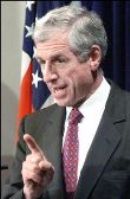US drops “sanctions” from draft resolution on Sudan but maintains the threat
By KIM GAMEL, Associated Press Writer
UNITED NATIONS, July 29, 2004 (AP) — The United States dropped the word “sanctions” from a draft U.N. resolution on Sudan on Thursday due to opposition on the Security Council, but it retained a threat of economic action against Khartoum if it fails to disarm Arab militias in Darfur.
 The Security Council announced it was ready to vote Friday on the resolution, which has been revised four times in the past week as the United States sought to overcome objections.
The Security Council announced it was ready to vote Friday on the resolution, which has been revised four times in the past week as the United States sought to overcome objections.
Pakistan, China and Russia argued that the 15-nation Security Council argued that Sudan should be given more time to end the violence that some have called ethnic cleansing and even genocide.
In Kuwait, Secretary of State Colin Powell told reporters the United States acquiesced in the change from “sanctions” to “measures” because the latter word was more acceptable to a broader number of Security Council members.
He acknowledged that there is concern in Egypt and some other countries that too much pressure on the Sudanese government could cause internal problems that would make the situation worse.
“At the same time, everybody recognizes that pressure is needed or else we wouldn’t get any action at all,” Powell said.
Algerian Ambassador Abdallah Baali, whose country also opposed the previous text, welcomed the new version and said he hoped for a unanimous vote. “At first glance, we feel that we are more comfortable with this text than we were with the other versions,” he said.
U.S. and British officials, speaking on condition of anonymity, said Pakistan, Russia and China still had reservations but they were confident the minimum nine “yes” votes could be obtained.
The new draft would still call on Sudan to disarm Arab militias blamed for rampant violence in the western region of Darfur.
It requires U.N. Secretary-General Kofi Annan to report every 30 days “and expresses its intention to consider further actions, including measures as provided for in Article 41 of the (U.N. Charter) on the Government of Sudan in the event of noncompliance.”
The previous text had specifically threatened “the imposition of sanctions.”
The draft also would impose an arms embargo that would apply to individuals, groups or governments that supply the pro-government Arab militias known as Janjaweed or rebel groups.
The Janjaweed have staged a brutal campaign to drive out black African farmers over the last 17 months. At least 30,000 civilians, most of them black villagers, have been killed, more than 1 million displaced and some 2.2 million left in urgent need of food or medical attention.
U.S. Ambassador John Danforth insisted the changes did not weaken the text and said he hoped for a unanimous vote to send a strong message to the Sudanese government to stop the violence.
“It’s the potential of sanctions in 30 days,” he said, reading the article from a copy of the U.N. charter. “The government of Sudan must fulfill that responsibility to the people of Darfur. If it does not then there will be consequences.”
Measures included in the 68-word Article 41 exclude the use of armed force but say “complete or partial interruption of economic relations … and the severance of diplomatic relations” could be considered.
Danforth stressed the importance of “starting the clock ticking,” with the 30-day clause, saying it was crucial to increase pressure on Sudan to rein in pro-government Arab militias who have killed thousands in a brutal campaign against black farmers in Darfur.
Sudan’s U.N. Ambassador Elfatih Mohamed Erwa criticized the resolution Wednesday, saying it was politically motivated. He said his government would work with the African Union to stop the violence.
“We are going to work with the African Union, not because there is a set of sanctions, but because we believe that this is the right path,” he said.
Egypt, which is not on the Security Council but wields great influence in the Arab world, also said it would try to prevent a resolution threatening sanctions from being adopted.
The Sudanese government, which has accused the international community of meddling, has promised to disarm the militias and says sanctions will only hurt those efforts.
The new draft also retains a clause calling on Sudan to “fulfill its commitments to disarm the Janjaweed militias,” as it told Annan it would do on July 3.
The Darfur conflict stems from long-standing tensions between nomadic Arab tribes and their African neighbors over dwindling water and farmland. Those tensions exploded into violence in February 2003 when two African rebel groups took up arms over what they regard as unjust treatment by the government.
U.S. and humanitarian officials have accused the Sudanese government of backing the Janjaweed, a claim the government denies.
